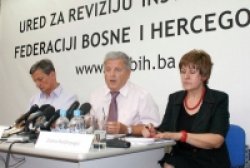
Nezavisne novine: The FBiH and cantons have in last year spent more than a billion KM for development, but the results or increase of employment are not visible, which shows that the funds have been spent without purpose, has been pointed out by the Federal Auditor General, Ibrahim Okanović.
Out of 46 executed audits for last year, negative opinion has been given to the Directorate for roads of the FBiH, the Ministry of Work and Social Policy of the FBiH, the FBiH budget, the Unsko-sanski canton, and public companies GRAS from Sarajevo and "Grijanje" from Zenica.
Okanović has said that monitoring of the funds divided through the current and capital transfers is weak, and it is normal to conclude that the division has been done without transparency, clear criterions, and purpose and in an illegal way.
"For the same sector, for the same project someone has been approved 500.000, someone a million KM. I conclude that the funds are being given by the company name, canton, and municipality. It is possible to guess which canton or village each minister comes from. Funds are even being divided without a full documentation", Okanović has added.
He has pointed out, when it is about the capital and current transfers, that the Ministry of Agriculture has divided 75 million KM out of which 50 million KM to companies and physical persons, and 25 million KM for stimulations. He has added that out of 45 million KM the Ministry of Traffic has given 29 million KM to "Željeznice FBiH", out of 7 million KM the Ministry for War Veterans Issues has given 3 million KM for vehicles to disabled persons, and the Ministry of Justice has given 800.000 KM to cultural associations, and the question is how does this ministry justify the cultural associations.
Driver spent more on a telephone bill than minister Even though the good vehicles have been bought; the vehicles which spend less and there is a decision by which 7.5 liters go for 100 kilometers, vehicles of some elected officials spend per 13, 15 and 18 liters.
"What is really unethical is the fact that many officials very often travel abroad over the weekend. Officials can use their vehicle for 24 hours per day, but not on Saturday and Sunday. There are high mobile phone bills and the same persons are always making those. Figures are between 500 and 1.000 KM per month", Ibrahim Okanović has said. To the question who does exceed the amount determined for phone bills, he mentioned the director of the Joint service of the FBiH, and has said that "the drivers are the ones, who spend more on telephone bills than some ministers".
Munib Ovčina, director of the Sector for financial audit of the institutions of BiH, has pointed out that the auditors have recorded more omissions than in 2007, and that the expenditures for salaries and remunerations, material, trip expenditures, contracts and temporary jobs have increased.
"The current reserve is being planned in the amount from 30 to 40 million KM and it serves only for immediate interventions and unpredicted expenditures, while by us they even pay the salaries from the current reserve", Okanović has said. He has added that the budget has been planned in the amount of 1.8 billion KM, while it has been achieved in the amount of 1.3 billion KM.
"If we have had 30% of the production growth, we would not have the budget such has been planned. The rebalance has not been done and it happens that it has been achieved with a deficit of 338 million KM. The deficit is even bigger because 74.5 million KM has not been shown. There is no professional preparation for budget planning", Okanović has said.
He has reminded that the highest participation in the FBiH budget have had capital and current transfers (392 million KM), war veteran remunerations (390 million KM), social sector (284 million KM), salaries to administration (242 million KM), and the external debt and interest rates (208 million KM).
He has pointed out that the expenditures could have been smaller by 400 million KM, and the investment in development could have increased, if the lots for social sector, war veterans would get reduced in a way that there is an institute, which will refuse or confirm the resolutions on payment of remunerations, and for administration in which people hired without contest should be fired.
